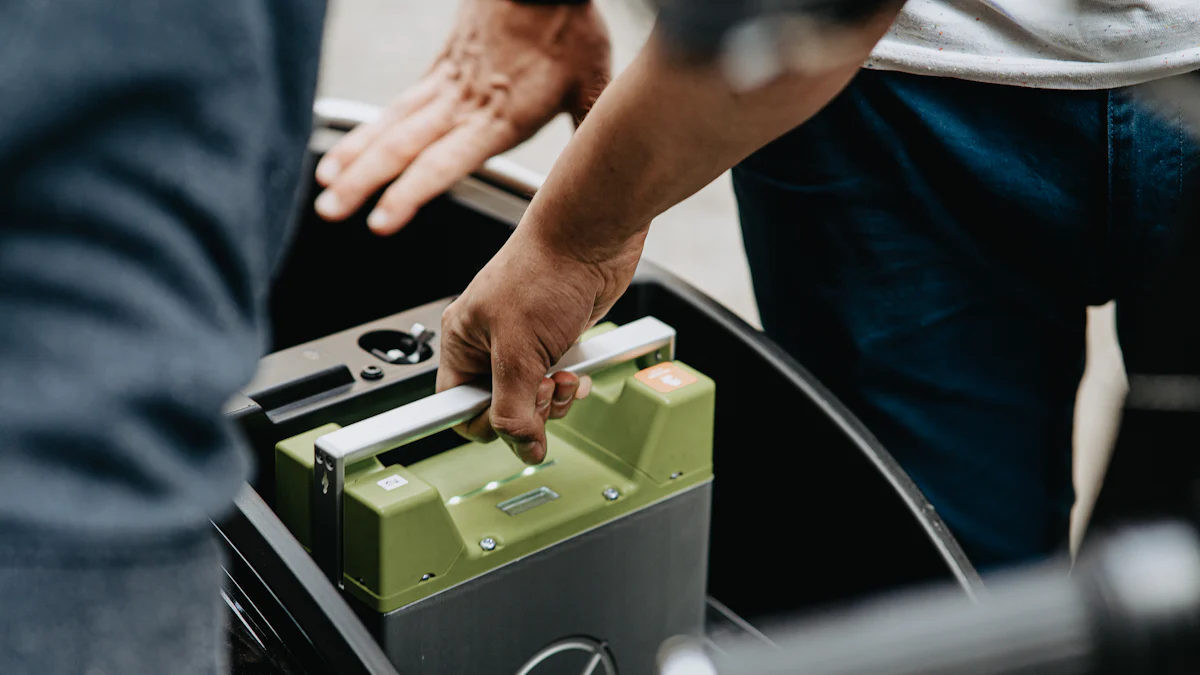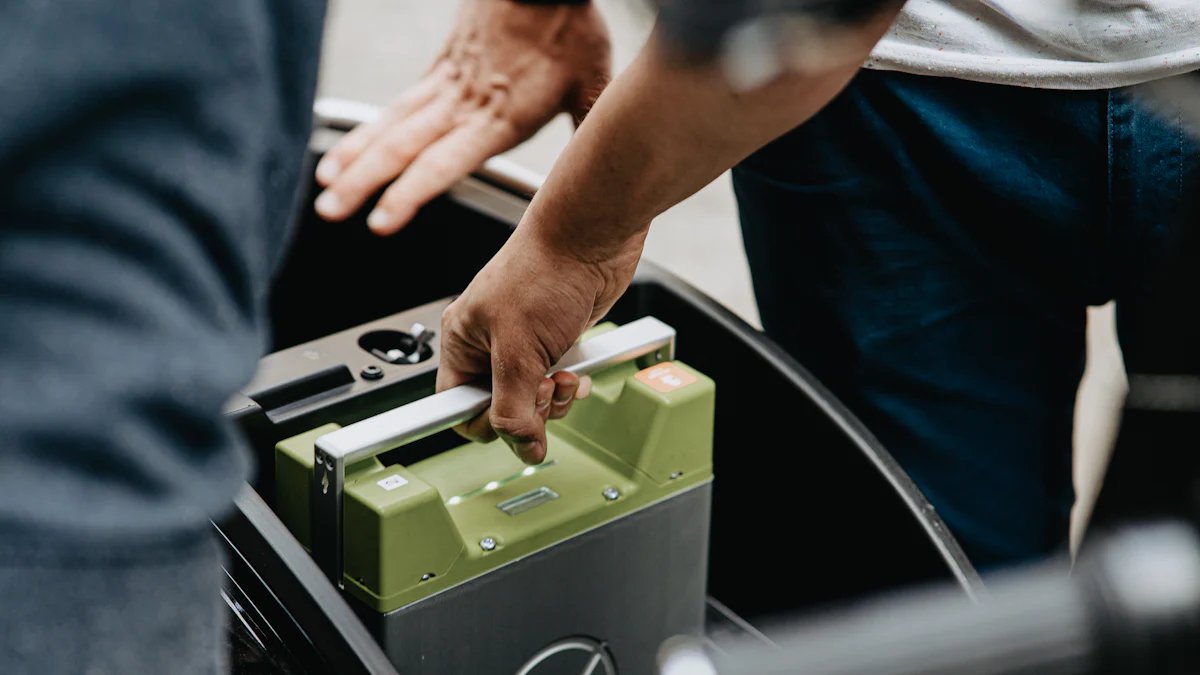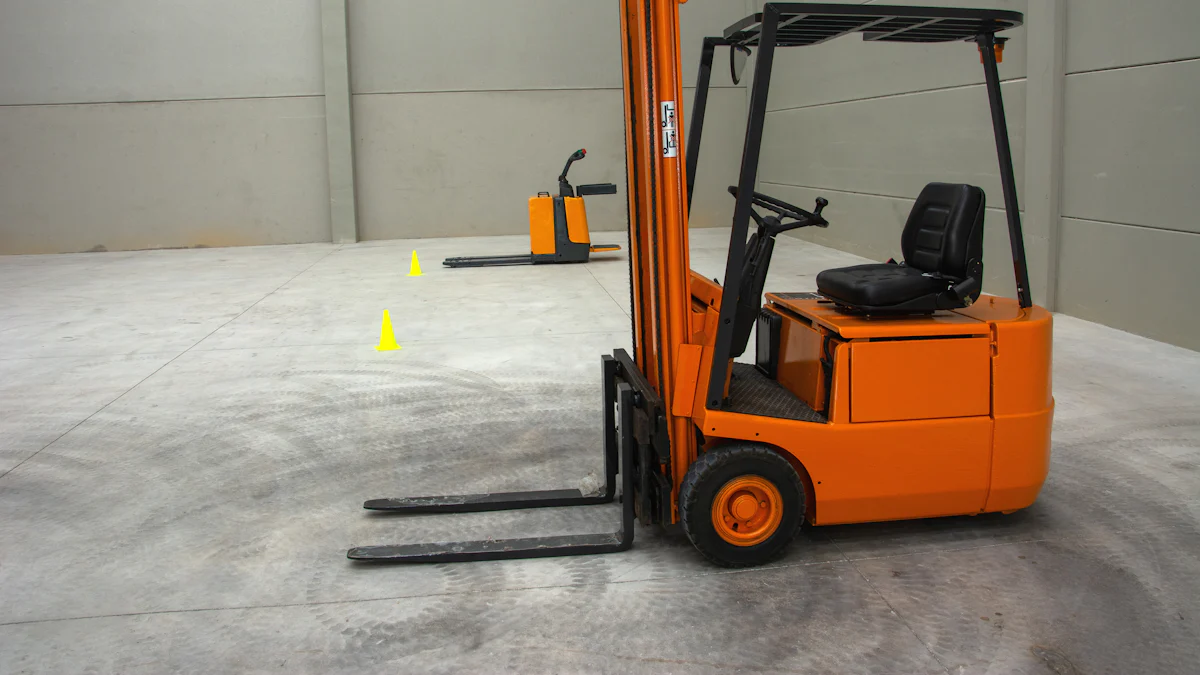
Choosing the right forklift battery is crucial for optimizing performance and efficiency. Material handling equipment users must consider various factors to ensure the best fit for their operations. Zoomsun, a leader in the industry, offers extensive expertise in battery forklift electric solutions. The company’s commitment to quality and innovation makes it a trusted partner for businesses worldwide.
Overview of Forklift Batteries

Lead-Acid Batteries
Characteristics
Lead-acid batteries are the most traditional type used in forklifts. These batteries consist of lead plates submerged in sulfuric acid. The chemical reaction between the lead and acid generates electricity. Lead-acid batteries come in various forms, including flooded (wet cell), gel cell, and absorbed glass mat (AGM).
Advantages
Lead-acid batteries offer several benefits:
- Cost-effectiveness: These batteries are generally less expensive compared to other types.
- Availability: Widely available and easy to source.
- Recyclability: High recyclability rate, making them an eco-friendly option.
Disadvantages
Despite their advantages, lead-acid batteries have some drawbacks:
- Maintenance: Require regular maintenance, including watering and equalizing charges.
- Health Hazards: Pose health risks due to off-gassing and acid spills.
- Weight: Heavier compared to other battery types, which can affect forklift performance.
Ideal Applications
Lead-acid batteries are ideal for operations with:
- Low to moderate usage: Suitable for single-shift operations.
- Budget constraints: Best for businesses looking for a cost-effective solution.
- Established maintenance routines: Companies with the capability to manage regular battery upkeep.
Lithium-Ion Batteries
Characteristics
Lithium-ion batteries are becoming increasingly popular in the forklift industry. These batteries use lithium salts as the electrolyte, providing a high energy density. Lithium-ion batteries come in various chemistries, including lithium iron phosphate (LiFePO4) and lithium nickel manganese cobalt oxide (NMC).
Advantages
Lithium-ion batteries offer numerous benefits:
- Fast Charging: Can be charged quickly, reducing downtime.
- Longer Cycle Life: Lasts longer than lead-acid batteries, with up to 3,000 cycles.
- Low Maintenance: Requires no watering or equalizing charges.
- High Energy Density: Provides more power in a smaller package.
Disadvantages
However, lithium-ion batteries also have some limitations:
- Higher Initial Cost: More expensive upfront compared to lead-acid batteries.
- Temperature Sensitivity: Performance can be affected by extreme temperatures.
- Recycling Challenges: More complex to recycle, requiring specialized facilities.
Ideal Applications
Lithium-ion batteries are best suited for:
- High-usage environments: Ideal for multi-shift operations.
- Operations needing quick turnaround: Perfect for businesses that cannot afford long charging times.
- Eco-conscious companies: Suitable for companies focusing on sustainability and low maintenance.
Nickel-Cadmium Batteries
Characteristics
Nickel-cadmium batteries are known for their reliability and long life. These batteries use nickel oxide hydroxide and metallic cadmium as electrodes. Nickel-cadmium batteries can achieve over 8,000 cycles, making them a durable choice.
Advantages
Nickel-cadmium batteries provide several advantages:
- Durability: Extremely long cycle life, offering consistent performance.
- High Energy Density: Delivers strong power output, allowing for quick charging.
- Minimal Degradation: Low degradation rate, between zero and 2%.
Disadvantages
Despite their benefits, nickel-cadmium batteries have some downsides:
- Cost: More expensive compared to other battery types.
- Weight: Heavier, which can impact forklift efficiency.
- Environmental Concerns: Use of cadmium raises environmental issues, making them less attractive for eco-focused companies.
Ideal Applications
Nickel-cadmium batteries are suitable for:
- Heavy-duty operations: Best for applications requiring high reliability and long life.
- Industries with high power demands: Ideal for environments needing quick charging and consistent performance.
- Companies with less focus on sustainability: Suitable for businesses where environmental concerns are secondary.
Factors to Consider When Choosing a Forklift Battery

Cost
Cost plays a crucial role in selecting the right battery forklift electric solution. Lead-acid batteries offer a lower initial cost, making them an attractive option for budget-conscious businesses. However, these batteries require replacement every 2-3 years, leading to additional disposal costs. On the other hand, lithium-ion batteries have a higher upfront cost but provide a longer lifespan. This reduces the frequency of replacements and minimizes downtime for operators. Businesses must weigh the initial investment against long-term savings to make an informed decision.
Maintenance Requirements
Maintenance requirements vary significantly between different types of battery forklift electric solutions. Lead-acid batteries demand regular upkeep, including watering and equalizing charges. This maintenance can be time-consuming and requires dedicated personnel. In contrast, lithium-ion batteries offer low maintenance benefits. These batteries do not need watering or equalizing charges, freeing up valuable time and resources. Companies must consider their capacity to manage ongoing maintenance when choosing a forklift battery.
Environmental Impact
Environmental impact is an important consideration for many businesses. Lead-acid batteries have a high recyclability rate, making them an eco-friendly option. However, these batteries pose health risks due to off-gassing and acid spills. Nickel-cadmium batteries raise environmental concerns because of their cadmium content. Lithium-ion batteries, while more complex to recycle, offer a cleaner alternative with no off-gassing. Companies focusing on sustainability should evaluate the environmental implications of each battery forklift electric type.
Performance Needs
Performance requirements play a crucial role in selecting the right battery forklift electric solution. Different operations demand varying levels of performance, which influences the choice of battery type.
Power Output
High power output is essential for demanding applications. Lithium-ion batteries provide superior power density, making them ideal for high-performance needs. These batteries deliver consistent power throughout their discharge cycle, ensuring optimal forklift performance. In contrast, lead-acid batteries experience a drop in voltage as they discharge, which can affect performance during extended use.
Charging Efficiency
Charging efficiency impacts operational uptime. Lithium-ion batteries excel in this area, offering fast charging capabilities. These batteries can reach full charge in a fraction of the time required by lead-acid batteries. This efficiency reduces downtime and increases productivity. Lead-acid batteries, on the other hand, require longer charging periods and must cool down after charging, further extending downtime.
Cycle Life
The cycle life of a battery determines its longevity and cost-effectiveness. Lithium-ion batteries offer a longer cycle life compared to lead-acid batteries. These batteries can last up to 3,000 cycles, reducing the frequency of replacements. Lead-acid batteries typically need replacement every 2-3 years, adding to long-term costs. Businesses must consider the total cost of ownership when evaluating cycle life.
Maintenance Demands
Maintenance demands vary significantly between battery types. Lead-acid batteries require regular maintenance, including watering and equalizing charges. This maintenance can be labor-intensive and time-consuming. Lithium-ion batteries offer low maintenance benefits, requiring no watering or equalizing charges. This aspect frees up valuable resources and reduces operational interruptions.
Environmental Considerations
Environmental impact is an important factor for many businesses. Lead-acid batteries have a high recyclability rate, making them an eco-friendly option. However, these batteries pose health risks due to off-gassing and acid spills. Nickel-cadmium batteries raise environmental concerns because of their cadmium content. Lithium-ion batteries, while more complex to recycle, offer a cleaner alternative with no off-gassing. Companies focusing on sustainability should evaluate the environmental implications of each battery forklift electric type.
Zoomsun’s Expertise and Product Offerings
Overview of Zoomsun’s Battery Solutions
Zoomsun has established itself as a leader in the material handling equipment industry. The company offers a wide range of battery forklift electric solutions tailored to meet diverse operational needs. Zoomsun‘s expertise spans over a decade, ensuring high-quality products and innovative technologies.
Zoomsun provides various types of forklift batteries, including lead-acid, lithium-ion, and nickel-cadmium options. Each battery type is designed to optimize performance and efficiency for different applications. The company’s modern manufacturing facility, equipped with advanced technologies, ensures the production of reliable and durable batteries.
Zoomsun‘s lead-acid batteries are cost-effective and widely available. These batteries are ideal for operations with low to moderate usage. The high recyclability rate of lead-acid batteries makes them an eco-friendly choice. However, regular maintenance is required to ensure optimal performance.
Zoomsun‘s lithium-ion batteries offer numerous advantages, such as fast charging and longer cycle life. These batteries are perfect for high-usage environments where downtime must be minimized. The low maintenance requirements of lithium-ion batteries make them a preferred choice for many businesses.
Zoomsun also offers nickel-cadmium batteries known for their durability and high energy density. These batteries are suitable for heavy-duty operations requiring consistent performance. Despite the higher cost, nickel-cadmium batteries provide long-term reliability.
Customer Testimonials and Case Studies
Zoomsun has received positive feedback from customers worldwide. Many businesses have benefited from the company’s battery forklift electric solutions. Here are some testimonials and case studies highlighting Zoomsun‘s impact:
“Our warehouse operations have significantly improved since switching to Zoomsun‘s lithium-ion batteries. The fast charging capabilities have reduced our downtime, allowing us to focus on moving goods efficiently.” – Warehouse Manager, Global Logistics Company
“We chose Zoomsun‘s lead-acid batteries for our single-shift operations. The cost-effectiveness and availability of these batteries have been a great advantage for our budget-conscious business.” – Operations Director, Manufacturing Firm
A case study involving a large distribution center demonstrated the benefits of Zoomsun‘s nickel-cadmium batteries. The center required a reliable solution for heavy-duty operations. Zoomsun‘s batteries provided consistent power output and long cycle life, enhancing overall productivity.
Another case study focused on a company with high sustainability goals. The company opted for Zoomsun‘s lithium-ion batteries due to their low maintenance and eco-friendly properties. The switch resulted in improved operational efficiency and reduced environmental impact.
- Summary of Key Points: Forklift batteries come in various types, each with unique characteristics. Lead-acid batteries offer cost-effectiveness and high recyclability. Lithium-ion batteries provide fast charging and low maintenance. Nickel-cadmium batteries deliver durability and high energy density.
- Recommendations for Choosing the Right Battery Type: Consider operational needs, budget constraints, and environmental impact. Lead-acid batteries suit budget-conscious operations with established maintenance routines. Lithium-ion batteries fit high-usage environments requiring quick turnaround. Nickel-cadmium batteries work best for heavy-duty applications needing long-term reliability.
- Final Thoughts on the Importance of Proper Battery Selection: Proper battery selection enhances forklift performance and operational efficiency. Businesses should evaluate their specific requirements to choose the most suitable battery type. Zoomsun offers a range of high-quality battery solutions tailored to diverse needs, ensuring optimal performance and customer satisfaction.
Post time: Jul-12-2024
